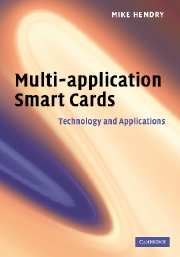Book contents
- Frontmatter
- Contents
- Foreword by Kevin Gillick
- Acknowledgements
- Part I Introduction
- Part II Technology
- Part III Business requirements
- 13 Common business requirements
- 14 Telecommunications
- 15 Banking
- 16 Transportation
- 17 Government and citizens' cards
- 18 Campus cards and closed user groups
- Part IV Implementation
- Appendix A Glossary
- Appendix B Further reading
- Appendix C Standards
- Index
- References
14 - Telecommunications
from Part III - Business requirements
Published online by Cambridge University Press: 11 August 2009
- Frontmatter
- Contents
- Foreword by Kevin Gillick
- Acknowledgements
- Part I Introduction
- Part II Technology
- Part III Business requirements
- 13 Common business requirements
- 14 Telecommunications
- 15 Banking
- 16 Transportation
- 17 Government and citizens' cards
- 18 Campus cards and closed user groups
- Part IV Implementation
- Appendix A Glossary
- Appendix B Further reading
- Appendix C Standards
- Index
- References
Summary
Telephone cards
The very first smart cards were issued in the mid 1980s as disposable prepaid cards for public telephones. They replaced magnetic stripe, optical or inductive cards with a technology that was generally more reliable; over 95% of all telephone cards for automatic use now employ smart card technology. The competition is not from other card-based systems but from centralised systems where the account is held on a host system rather than on the card itself (even if a card is used to deliver the account number to the user).
The business requirement for a public telephone operator is to eliminate the collection of cash in telephones using a reliable system with a minimum of moving parts. Coin-operated telephones are expensive to build, since they must be very robust; they are expensive to operate (the cash must be collected regularly) and to maintain (coin mechanisms frequently become jammed or are vandalised).
Smart cards can be sold by retailers like any other goods and so can be made very widely available. The ‘float’ of value sold but not yet used is available to the operator and can earn interest (although it does still represent a liability in accounting terms). Smart cards, therefore, offer a very convenient and portable way to sell value; however they also have some disadvantages:
The cards themselves must be manufactured and distributed; card cost may be as low as 8–10 cents but as a proportion of the smallest denomination value (which may be $2 or even less) this is still substantial. In addition, the distributors and retailers need to make a margin, which may be 5–15% of the card value;
[…]
- Type
- Chapter
- Information
- Multi-application Smart CardsTechnology and Applications, pp. 129 - 143Publisher: Cambridge University PressPrint publication year: 2007



